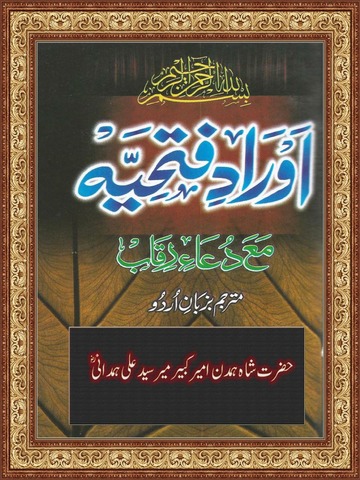Awrad-e-Fatiha is a sacred compilation of Quranic verses and prayers, gifted by Mir Syed Ali Hamadani to enrich faith and bring peace to generations.
By Khursheed Dar
Awrad-e-Fatiha, an anthology of Quranic verses, holds a central place in the spiritual lives of Kashmiri Muslims. Its core theme revolves around the concept of monotheism (Tawheed), emphasizing the oneness of Allah, the Almighty. The term Awrad refers to repeated short prayers or litanies, and this compilation has been a spiritual cornerstone in Kashmir for centuries.
This booklet of religious litanies, introduced by the revered Islamic scholar and Sufi saint, Mir Syed Ali Hamadani (RA) (1312–1384), known in Kashmir as Amir-e-Kabeer and Shah-e-Hamadan, has immeasurable spiritual significance. Mir Syed Ali Hamadani, a luminary from Hamadan (modern-day Iran), brought this treasure to Kashmir during the 14th century, inspiring generations of believers to recite it after the obligatory Fajr (dawn) prayer.
Mir Syed Ali Hamadani was a divine figure, guided and assisted by spiritual insight. His profound influence led to the widespread acceptance of Islam in the Kashmir Valley through the principles of love and peace. The Awrad-e-Fatiha, written in eloquent Arabic, reflects his mission of spreading monotheism and his deep connection to Allah. It is considered a hallmark of his legacy, blending simplicity with profound wisdom to make the teachings accessible to the common masses.
The Origins and Compilation of Awrad-e-Fatiha
Mir Syed Ali Hamadani authored several works in Arabic and Persian, but Awrad-e-Fatiha stands out as one of his most cherished compositions. It is said that he compiled the wazaif (prayers) of over 1,400 pious saints (auliya-e-kiram) during his lifetime and shaped them into this concise booklet. The saint received divine approval for this work, including permission from Hazrat Khidr and, ultimately, the Prophet Muhammad (peace be upon him). This spiritual endorsement is symbolized by the inclusion of 17 salutations (salam) at the end of the booklet.
Mir Syed Ali Hamadani is also believed to have received the Awrad-e-Fatiha during a spiritual vision of the Prophet Muhammad (peace be upon him) and was taught the proper method of its congregational recitation. This adds a unique sanctity to the wazaif, which has been a spiritual gift to the people of Kashmir for centuries.
Structure and Content of Awrad-e-Fatiha
The opening lines of Awrad-e-Fatiha are an eloquent expression of praise and gratitude to Allah, emphasizing His attributes, greatness, and mercy. These verses also highlight the importance of seeking forgiveness (Istighfar) for sins, a recurring theme in Islamic teachings. Mir Syed Ali Hamadani encourages believers to turn to Allah in humility and repentance, seeking His mercy and guidance.
The text is a masterpiece of theological and spiritual thought, illustrating the grandeur of Allah’s attributes. From praising Allah’s sovereignty to affirming His unmatched power, the Awrad-e-Fatiha serves as a guide for believers to connect directly with their Creator. The repeated invocations reinforce faith, provide solace in times of distress, and remind believers of their ultimate purpose.
The Impact of Awrad-e-Fatiha
For the people of Kashmir, Awrad-e-Fatiha is more than a booklet; it is a way of life. Its recitation has been a daily ritual since the 14th century, deeply ingrained in the cultural and religious fabric of the region. Even today, it is memorized by tens of thousands of Kashmiris, including many who are illiterate, attesting to its profound influence.
The Awrad-e-Fatiha is especially revered during times of calamity or personal hardship. Its recitation is believed to bring spiritual relief, alleviate anxiety, and heal troubled minds. This booklet has also been translated into multiple languages, including Kashmiri, ensuring its accessibility to diverse audiences.
The Message of Monotheism and Gratitude
The teachings of Awrad-e-Fatiha revolve around the core Islamic tenets of Tawheed (monotheism), gratitude, and repentance. Mir Syed Ali Hamadani emphasizes that true success lies in turning to Allah alone, acknowledging His countless blessings, and remaining steadfast in faith. Through its verses, believers are reminded to seek Allah’s forgiveness, recognize His grandeur, and express gratitude for His infinite bounties.
The booklet is not only a spiritual tool but also a manifestation of Mir Syed Ali Hamadani’s mission of spreading peace, love, and divine wisdom. It serves as a bridge connecting the believer’s heart to Allah, providing both solace and spiritual enlightenment.
A Timeless Gift
The Awrad-e-Fatiha remains a timeless gift to the Kashmiri people, encapsulating the spiritual essence of Mir Syed Ali Hamadani’s teachings. Its significance lies not only in its content but also in its ability to inspire believers to strive for a deeper connection with their Creator. In a world often fraught with turmoil, the Awrad-e-Fatiha stands as a beacon of hope and guidance, reminding believers of the power of faith, repentance, and gratitude.
For centuries, this divine booklet has been a source of spiritual strength and continues to enrich the lives of countless devotees. It is a testament to Mir Syed Ali Hamadani’s enduring legacy and his unwavering dedication to spreading the light of Islam.
The views expressed in this article are solely those of the author and do not necessarily reflect the opinions or views of this Magazine. The author can be reached at [email protected]


Leave a Reply